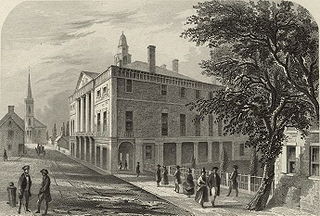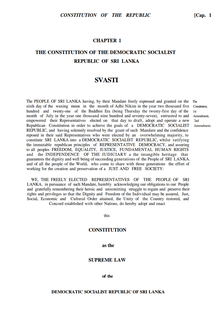
The Prime Minister of India is the leader of the executive of the Government of India. The prime minister is also the chief adviser to the President of India and head of the Council of Ministers. They can be a member of any of the two houses of the Parliament of India—the Lok Sabha and the Rajya Sabha —but has to be a member of the political party or coalition, having a majority in the Lok Sabha.

An electoral college is a set of electors who are selected to elect a candidate to a particular office. Often these represent different organizations, political parties, or entities, with each organization, political party or entity represented by a particular number of electors or with votes weighted in a particular way.

The President of India is the ceremonial head of state of India and the commander-in-chief of the Indian Armed Forces.

The First United States Congress, consisting of the United States Senate and the United States House of Representatives, met from March 4, 1789, to March 4, 1791, during the first two years of George Washington's presidency, first at Federal Hall in New York City and later at Congress Hall in Philadelphia. With the initial meeting of the First Congress, the United States federal government officially began operations under the new frame of government established by the 1787 Constitution. The apportionment of seats in the House of Representatives was based on the provisions of Article I, Section 2, Clause 3 of the Constitution. Both chambers had a Pro-Administration majority. Twelve articles of amendment to the Constitution were passed by this Congress and sent to the states for ratification; the ten ratified as additions to the Constitution on December 15, 1791, are collectively known as the Bill of Rights.

The President of Russia, officially the President of the Russian Federation, is the head of state of the Russian Federation, as well as holder of the highest office in Russia and commander-in-chief of the Russian Armed Forces.
A constitutional amendment is a modification of the constitution of a polity, organization or other type of entity. Amendments are often interwoven into the relevant sections of an existing constitution, directly altering the text. Conversely, they can be appended to the constitution as supplemental additions (codicils), thus changing the frame of government without altering the existing text of the document.

The President of Pakistan, is the head of state of the Islamic Republic of Pakistan and the civilian Commander-in-Chief of the Pakistan Armed Forces, per the Constitution of Pakistan. The office-holder represents the "unity of the Republic". The current President of Pakistan is Arif Alvi.

The Victorian Legislative Council (VLC) is the upper house of the bicameral Parliament of Victoria, Australia; the lower house being the Legislative Assembly. Both houses sit at Parliament House in Spring Street, Melbourne. The Legislative Council serves as a house of review, in a similar fashion to its federal counterpart, the Australian Senate. Although it is possible for legislation to be first introduced in the Council, most bills receive their first hearing in the Legislative Assembly.
Age of candidacy is the minimum age at which a person can legally qualify to hold certain elected government offices. In many cases, it also determines the age at which a person may be eligible to stand for an election or be granted ballot access.

The current Constitution of the Syrian Arab Republic was adopted on 26 February 2012, replacing one that had been in force since 13 March 1973. The current constitution delineates the basic function of that state's government. Among other things, it determines Syria's character to be Arab, democratic, and republican. Further, in line with pan-Arab ideology, it describes the country as a region of the wider Arab world and its people as an integral part of the Arab nation.

The House of Representatives is the lower chamber of the bicameral legislative branch of Liberia, and together with the Senate comprises the Legislature of Liberia. The number of seats is fixed by law at 73, with each county being apportioned a number of seats based on its percentage of the national population. House members represent single-member districts within the counties drawn up by the National Elections Commission and serve six-year terms. The House meets at the Capitol Building in Monrovia.

The Constitution of the Democratic Socialist Republic of Sri Lanka has been the constitution of the island nation of Sri Lanka since its original promulgation by the National State Assembly on 7 September 1978. As of May 2015 it has been formally amended 19 times.

The National Assembly of Thailand is the bicameral legislative branch of the government of Thailand. It convenes in the Parliament House, Dusit District, Bangkok.

In the United States, a state is a constituent political entity, of which there are currently 50. Bound together in a political union, each state holds governmental jurisdiction over a separate and defined geographic territory and shares its sovereignty with the federal government. Due to this shared sovereignty, Americans are citizens both of the federal republic and of the state in which they reside. State citizenship and residency are flexible, and no government approval is required to move between states, except for persons restricted by certain types of court orders. Four states use the term commonwealth rather than state in their full official names.

The 12th New York State Legislature, consisting of the New York State Senate and the New York State Assembly, met from December 11, 1788, to March 3, 1789, during the twelfth year of George Clinton's governorship, in Albany.

Dáil Éireann is the lower house, and principal chamber, of the Oireachtas, which also includes the President of Ireland and Seanad Éireann. It currently consists of 158 members, known as Teachta Dála. TDs represent 40 constituencies, and are directly elected at least once every five years under the system of proportional representation by means of the single transferable vote (STV). Its powers are similar to those of lower houses under many other bicameral parliamentary systems and it is by far the dominant branch of the Oireachtas. Subject to the limits imposed by the Constitution of Ireland, it has power to pass any law it wishes, and to nominate and remove the Taoiseach. Since 1922, it has met in Leinster House in Dublin.

Fiji's fourth constitution was signed into law by President Ratu Epeli Nailatikau on September 6, 2013, coming into effect immediately. It is the first to eliminate race-based electoral rolls, race-based seat quotas, district-based representation, the unelected upper chamber, and the role of the hereditary Council of Chiefs. It vests sole legislative authority in a single-chamber, 50-seat, at-large Parliament, to be first convened following general elections in 2014. It is also the first ever to grant the right to multiple citizenship, and lowers the voting age to 18.

The United States elections of 1788–89 were the first federal elections in the United States since the ratification of the United States Constitution in 1788. In the elections, the George Washington was elected as the first president and the members of the 1st United States Congress were selected.

















